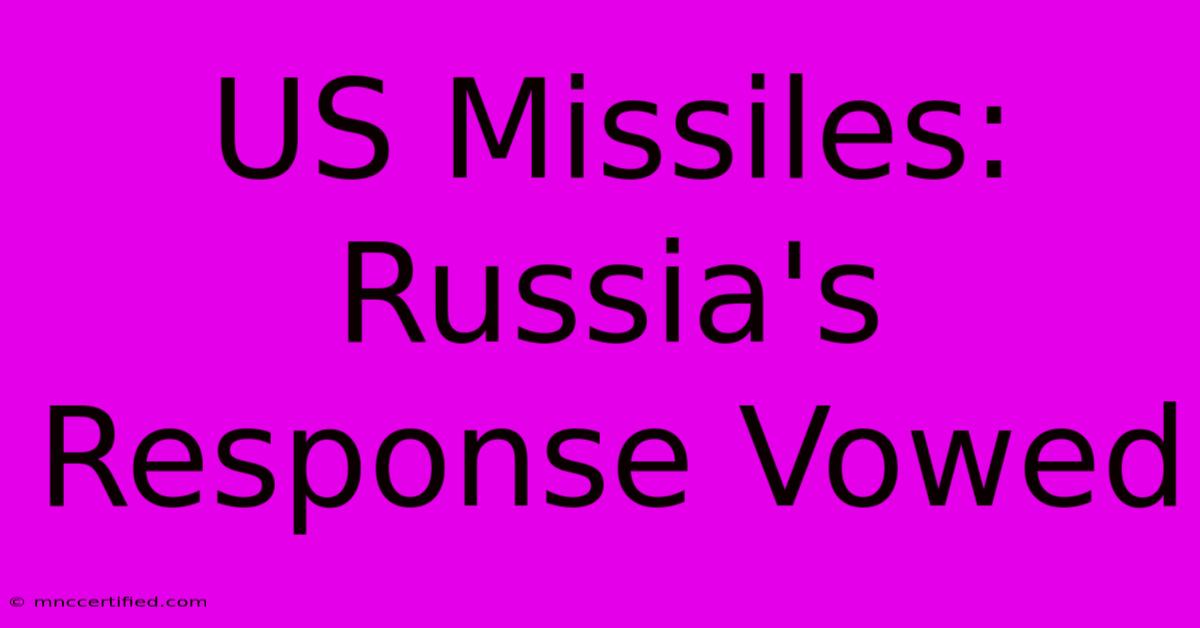US Missiles: Russia's Response Vowed

Table of Contents
US Missiles: Russia's Response Vowed
Russia has vowed a response to the continued deployment of US missiles near its borders, escalating tensions between the two nuclear powers. This situation demands careful analysis, understanding the historical context, the current geopolitical landscape, and the potential ramifications of further escalation.
The Geopolitical Context: A History of Tensions
The current tensions surrounding US missile deployments are not isolated incidents. They stem from a long history of mistrust and strategic competition between the US and Russia, dating back to the Cold War. The dissolution of the Soviet Union didn't erase these underlying tensions; instead, it reshaped them. NATO expansion eastward, particularly after the collapse of the Soviet Union, has been a recurring point of contention for Russia. Russia views this expansion as a direct threat to its security interests, a perception fueled by the deployment of US military assets closer to its borders.
Key Events Leading to the Current Crisis
Several key events have exacerbated the current crisis:
- NATO expansion: The eastward expansion of NATO, bringing former Warsaw Pact countries into the alliance, is perceived by Russia as a breach of promises made after the end of the Cold War.
- US missile defense systems: The deployment of US missile defense systems in Europe is another source of friction, with Russia claiming these systems could be adapted to target its nuclear arsenal.
- Ukraine conflict: The conflict in Ukraine has further strained relations, with Russia accusing the US of supporting the Ukrainian government and destabilizing the region.
- Recent missile deployments: The most recent deployments of US missiles near Russian borders have served as the immediate catalyst for the current crisis.
Russia's Response: Vague Threats and Concrete Actions
Russia has consistently warned against further US missile deployments, issuing both verbal and implied threats. While the exact nature of Russia's response remains unclear, it's likely to involve a multifaceted approach:
Military Posturing and Escalation
Russia might respond by:
- Deploying its own missiles: This is a highly probable response, aiming to achieve a military balance or even a perceived advantage. The location and type of missiles deployed would be crucial factors in determining the level of escalation.
- Increased military exercises: More frequent and larger-scale military exercises near the borders could serve as a show of force and a warning to the US.
- Cyberattacks: Cyber warfare provides a less overt method of retaliation, potentially targeting US infrastructure or military systems.
Diplomatic Pressure and Negotiations
Alongside military posturing, Russia is likely to pursue diplomatic channels to address its concerns:
- Bilateral talks: Direct negotiations with the US could offer a path towards de-escalation, though past attempts have yielded limited success.
- Multilateral forums: Russia might seek support from other countries in international forums to pressure the US to change its policies.
- Public pronouncements: Continued public statements and media campaigns aim to sway public opinion both domestically and internationally, adding pressure on the US.
The Dangers of Escalation and the Path Forward
The situation is precarious, with the potential for miscalculation and accidental escalation being a significant concern. Both the US and Russia possess nuclear arsenals capable of devastating global consequences. A path towards de-escalation requires a nuanced approach focusing on:
- Open communication: Direct and transparent communication channels are crucial to avoid misunderstandings and prevent accidental conflict.
- Mutual de-escalation: Both sides must take concrete steps to reduce tensions, such as limiting military exercises and avoiding provocative rhetoric.
- Confidence-building measures: Implementing confidence-building measures, such as transparency in military activities, can help reduce mistrust and improve predictability.
- Addressing underlying concerns: Addressing the root causes of the conflict, including the security concerns of Russia regarding NATO expansion, is essential for long-term stability.
The ongoing tension surrounding US missiles and Russia's vowed response demands careful attention and a commitment to diplomatic solutions. The consequences of escalation are too severe to ignore. The international community has a critical role to play in fostering dialogue and promoting a peaceful resolution. Failure to do so could have devastating global consequences.

Thank you for visiting our website wich cover about US Missiles: Russia's Response Vowed. We hope the information provided has been useful to you. Feel free to contact us if you have any questions or need further assistance. See you next time and dont miss to bookmark.
Featured Posts
-
Testosterone Covered By Insurance
Nov 19, 2024
-
Best Kc Chiefs Fan Gifts This Year
Nov 19, 2024
-
Conditional Contract In Insurance
Nov 19, 2024
-
Life Insurance Of Sw Phone Number
Nov 19, 2024
-
7 Photos Kelce Vs Bills
Nov 19, 2024